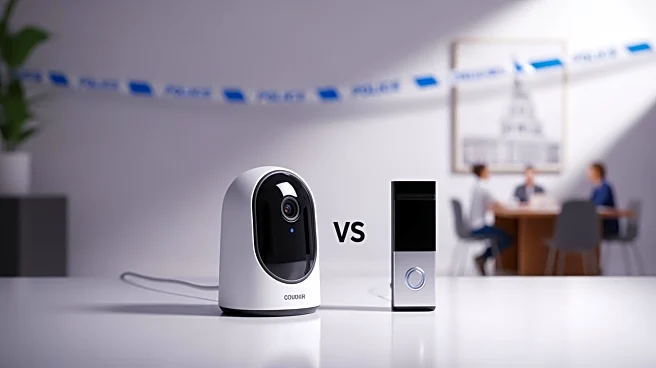What's Happening?
In 2025, the competition between Ring and Google Nest intensifies as both companies release new high-resolution, AI-equipped security devices. Ring, owned by Amazon, has introduced 2K and 4K cameras with
enhanced AI features, while Google Nest has launched its third-generation line with 2K resolution and Gemini for Home AI capabilities. Ring is known for its compatibility with Amazon Alexa, offering a range of customizable options, whereas Nest is favored by users of Google Home, providing a more streamlined experience. Both brands have made significant strides in AI technology, with Ring focusing on features like facial recognition and Alexa Plus Greetings, and Nest offering free package and person detection. The choice between these brands often depends on the user's preferred smart home ecosystem.
Why It's Important?
The advancements in smart home security technology by Ring and Nest reflect a growing consumer demand for integrated and intelligent home security solutions. This competition is significant as it drives innovation and potentially lowers costs for consumers. The integration of AI features enhances security by providing more accurate alerts and insights, which can lead to increased adoption of smart home technologies. The rivalry also highlights the strategic importance of ecosystem compatibility, as consumers are likely to choose devices that seamlessly integrate with their existing smart home setups. This trend could influence market dynamics, with companies focusing on creating more comprehensive and user-friendly smart home environments.
What's Next?
As Ring and Nest continue to develop their AI capabilities, consumers can expect more advanced features and improved user experiences. Both companies are likely to expand their product lines and enhance their subscription services to offer more value. The focus on AI-driven security solutions may lead to further innovations in home automation and connectivity. Additionally, the competition may prompt other tech companies to enter the smart home security market, increasing options for consumers. Stakeholders, including tech companies and consumers, will be closely watching how these developments impact the broader smart home industry.
Beyond the Headlines
The competition between Ring and Nest also raises important questions about data privacy and security. As these devices become more integrated into daily life, concerns about data collection and usage are likely to grow. Both companies have faced scrutiny in the past, and maintaining consumer trust will be crucial. The ethical implications of AI in home security, such as facial recognition, will continue to be a topic of debate, potentially influencing regulatory actions and consumer preferences.









